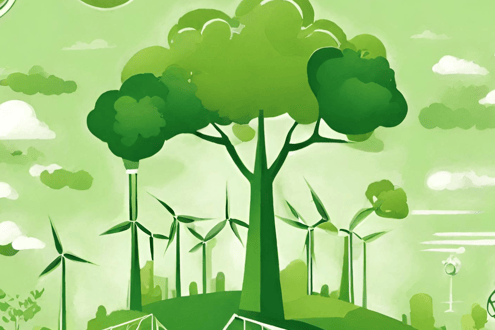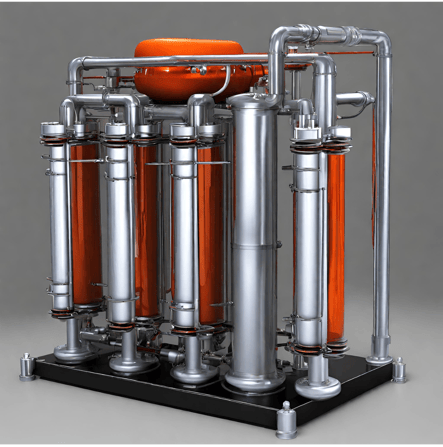At Team Benz There Done That (BTDT), we embarked on a groundbreaking project commissioned by Olin Ingenuity to develop a pilot plant for mass benzene production. Benzene, a versatile compound with applications ranging from petrochemicals to polymers, holds significant global demand, with projections estimating a market value surpassing $115 billion by 2027.
Benzene Pilot Plant Project
Our project aimed to design and simulate a pilot plant capable of producing approximately 135,000 tonnes of benzene annually with a remarkable product purity of 97%. Departing from traditional methods, our design integrated a state-of-the-art membrane separator to enhance hydrogen recycle efficiency and eliminated one distillation tower, significantly reducing capital and utility costs.
Project Overview
Challenges and Economic Viability
Despite technological advancements, economic viability remained a challenge due to the volatile nature of raw material pricing. Additionally, the cooling-intensive nature of the plant posed significant challenges in meeting cooling water requirements, prompting further optimization efforts and exploration of alternative cooling strategies.
Stringent Safety Protocols and Environmental Controls
Environmental sustainability was at the forefront of our design philosophy. By implementing innovative carbon capture processes utilizing monoethanolamine, we achieved an impressive reduction of carbon dioxide emissions by over 90%, underscoring our commitment to eco-conscious manufacturing practices.
Environmental Considerations
To address environmental concerns and reduce costs, we devised a strategy to recycle the methane purge stream as fuel for the fired heater. By repurposing this stream, we not only minimized waste disposal costs but also reduced the need for additional fuel procurement, optimizing overall process efficiency and sustainability.
Implementing post-combustion carbon capture using monoethanolamine (MEA) proved instrumental in reducing carbon dioxide emissions by an impressive 90%. Through meticulous design and optimization of absorber and stripper units, we effectively captured and sequestered carbon dioxide, mitigating environmental impact and contributing to climate change mitigation efforts.
Analyzing the composition of the methane purge stream and effluent gas enabled us to develop targeted mitigation strategies. By ensuring complete combustion of methane and minimizing nitrogen oxide (NOx) emissions, we mitigated potential environmental hazards. Our focus on reducing carbon dioxide emissions through post-combustion carbon capture further underscored our commitment to environmental responsibility.


Determination of Total Pollutants
Reduction of Carbon Dioxide Emissions
Embedded within our project framework were stringent safety protocols and environmental controls, ensuring the well-being of our team members and surrounding communities. Through comprehensive risk assessments and proactive mitigation strategies, we mitigated potential hazards and environmental impacts, upholding our commitment to safety and environmental stewardship.
Reduction of Pollutant Streams via Methane Recycle
In-depth analysis and optimization of process kinetics, alongside rigorous examination of the membrane separator's performance under real-world conditions, were critical to ensuring alignment with design parameters and validating feasibility.
Technical Considerations
Advanced Membrane Separation Techniques
Delving into reactor design intricacies, our team engineered innovative solutions to optimize benzene production processes. Leveraging cutting-edge technologies and computational simulations, we fine-tuned reactor configurations, achieving exceptional conversion rates and product purity. Our meticulous design approach resulted in enhanced process efficiency and scalability, laying the foundation for future advancements in benzene production technology.
Navigating the intricacies of thermodynamics, our team employed sophisticated optimization strategies to fine-tune operational conditions and minimize energy consumption. By leveraging thermodynamic principles, we optimized heat and mass transfer processes, enhancing overall plant efficiency and economic viability while minimizing environmental impact.
Precise Process Kinetics Analysis


Diving into the realm of membrane separation, our team pioneered innovative approaches to enhance hydrogen recycling efficiency. Through meticulous design and implementation of advanced membrane separators, we achieved unprecedented levels of hydrogen purity, ensuring optimal performance and resource utilization within the benzene production process.
At the heart of our project lay a comprehensive analysis of process kinetics, where we meticulously scrutinized reaction mechanisms and kinetics to optimize benzene yield and reactor performance. Through rigorous experimentation and simulation, we fine-tuned reaction parameters, achieving exceptional conversion rates and product purity, setting new standards for process efficiency.
Innovative Reactor Design and Optimization
Thermodynamic Optimization Strategies
Skills I Developed
Environmental Management
I specialize in advanced membrane separation and process optimization, ensuring efficient hydrogen recycling and product purity.
I identify pollutants and implement carbon capture technologies, reducing emissions by 90% and promoting sustainable practices.
Technical Mastery
Collaboration Skills
I manage projects effectively, ensuring adherence to budget and timelines through proactive risk management and team collaboration.
I foster teamwork and communication, promoting accountability and productivity among team members.
Project Leadership
Analytical Precision
With strong analytical skills, I make data-driven decisions and address challenges effectively.
Adaptability and Learning:
I adapt to change, embrace new technologies, and prioritize continuous learning for personal and professional growth.
